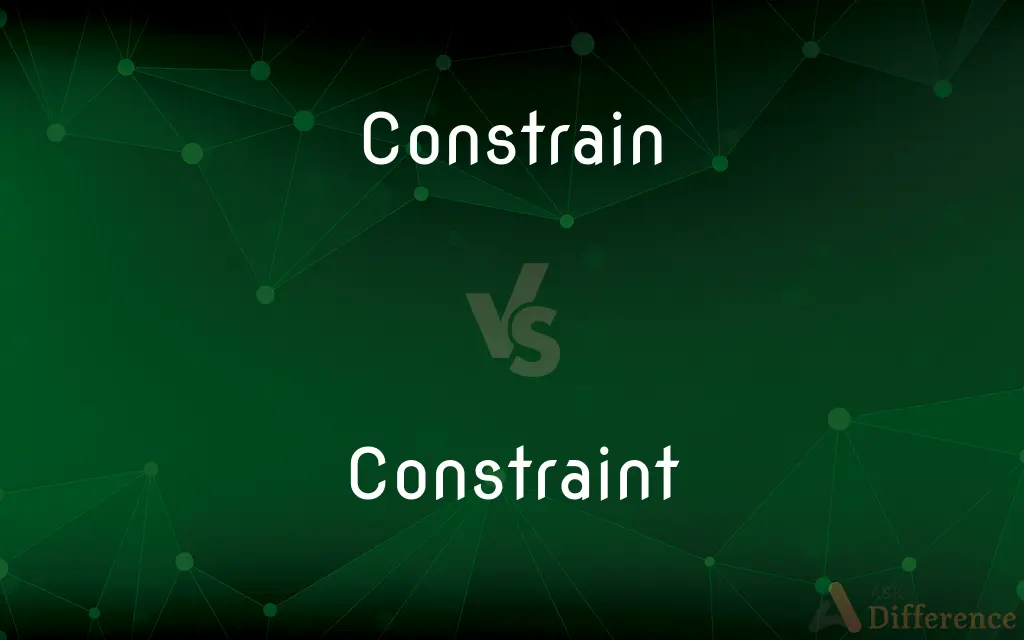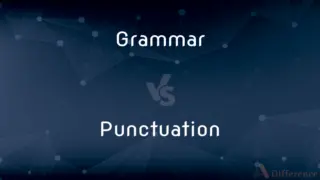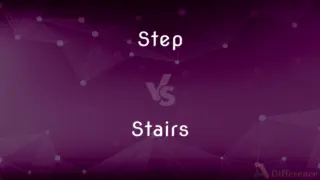Constrain vs. Constraint — What's the Difference?
By Tayyaba Rehman — Updated on July 19, 2023
"Constrain" is a verb meaning to restrict or limit. "Constraint" is a noun denoting a restriction or limitation. Both words relate to imposing restrictions but differ in their grammatical use.

Difference Between Constrain and Constraint
Table of Contents
ADVERTISEMENT
Key Differences
"Constrain" is a verb. "Constraint," on the other hand, is a noun.
"Constrain" is an action word that conveys the act of limiting or restricting someone or something. "Constraint" refers to the state or condition of being limited or restricted.
The usage of "constrain" often implies an action that is currently happening or may happen in the future. Whereas "constraint" typically signifies a condition that is already in place.
Both "constrain" and "constraint" derive from the same Latin root, "constringere", which means "to bind together or tie tightly." While they share this common origin and both involve limitation or restriction, their difference lies in their grammatical role: one is an action (verb), and the other is a condition or state (noun).
Comparison Chart
Part of Speech
Verb
Noun
ADVERTISEMENT
Definition
To limit or restrict
The state of being limited or restricted
Example
"These rules constrain us from playing."
"There are several constraints to consider."
Usage
Implies an action that's happening or may occur
Signifies a condition already in place
Origin
Derived from Latin "constringere"
Also derived from Latin "constringere"
Synonyms
Restrict, limit, hinder
Limitation, restriction, hindrance
Compare with Definitions
Constrain
To keep within certain limits; confine or limit.
"Legislators ... used the power of the purse to constrain the size of the military" (Julian E. Zelizer).
Constraint
A restriction or limitation on possible actions or solutions.
Due to budget constraints, we had to limit our spending on advertising.
Constrain
To restrict or limit the freedom or natural development of something.
The small budget will constrain the scope of our project.
Constraint
A rule or condition that a solution to a problem must satisfy.
The physics of our world introduces certain constraints that make perpetual motion machines impossible.
Constrain
In mathematics, to restrict the variables of a formula or equation.
In this optimization problem, we constrain x to be greater than or equal to zero.
Constraint
In mathematics and physics, a relation restricts the degrees of freedom of a system.
In robotics, the joints' mechanical structure imposes constraints on the robot's motion.
Constrain
To hold back or secure something by a physical force.
The tight rope was used to constrain the cargo to the truck's bed.
Constraint
The act of constraining; the threat or use of force to control the thoughts or behavior of others.
Constrain
To confine within bounds; to limit or curtail.
Our limited resources constrain us to prioritize our most urgent needs.
Constraint
In computer science, a specification that user-provided data must satisfy in a database.
The unique constraint in the database ensures that no two entries will have the same ID.
Constrain
To inhibit or restrain; hold back.
"She noticed her mother blushing and acting somewhat constrained in her conversation with the grandmother" (David Huddle).
Constraint
The threat or use of force to prevent, restrict, or dictate the action or thought of others.
Constrain
To compel by physical, moral, or circumstantial force; oblige.
She felt constrained to object to his behavior.
Constraint
The state of being restricted or confined within prescribed bounds.
He was soon tired of the constraint of military life.
Constrain
To produce in a forced or inhibited manner.
"This smile seemed to touch something off in her ... and playfully she constrained her own roguish smile" (Naeem Murr).
Constraint
One that restricts, limits, or regulates; a check.
He ignored all moral constraints in his pursuit of success.
Constrain
(transitive) To force physically, by strong persuasion or pressuring; to compel; to oblige.
Constraint
Embarrassed reserve or reticence; awkwardness.
"All constraint had vanished between the two, and they began to talk" (Edith Wharton).
Constrain
(transitive) To keep within close bounds; to confine.
Constraint
Something that constrains; a restriction.
Constrain
(transitive) To reduce a result in response to limited resources.
Constraint
An irresistible force or compulsion.
Constrain
To secure by bonds; to chain; to bond or confine; to hold tightly; to constringe.
He binds in chains the drowsy prophet, and his limbs constrains.
When winter frosts constrain the fields with cold.
Constraint
The repression of one's feelings.
Constrain
To bring into a narrow compass; to compress.
How the strait stays the slender waist constrain.
Constraint
(mathematics) A condition that a solution to an optimization problem must satisfy.
Constrain
To hold back by force; to restrain; to repress.
My sire in caves constrains the winds.
Constraint
(databases) A linkage or other restriction that maintains database integrity.
Constrain
To compel; to force; to necessitate; to oblige.
I was constrained to appeal unto Caesar; not that I had ought to accuse my nation of.
Constraint
The act of constraining, or the state of being constrained; that which compels to, or restrains from, action; compulsion; restraint; necessity.
Long imprisonment and hard constraint.
Not by constraint, but by my choice, I came.
Constrain
To violate; to ravish.
Constraint
The state of being physically constrained.
Dogs should be kept under restraint.
Constrain
To produce in such a manner as to give an unnatural effect; as, a constrained voice.
Constraint
A device that retards something's motion.
The car did not have proper restraints fitted.
Constrain
Hold back.
Constraint
A force that compels or restrains from a course of action.
The constraint of public opinion often influences politicians' decision-making process.
Constrain
Restrict.
Constrain
To compel or force someone towards a particular course of action.
His responsibilities at home constrain him from traveling too often.
Common Curiosities
What is the difference between constrain and constraint?
Constrain is a verb indicating the act of limiting or restricting someone or something. Constraint, on the other hand, is a noun that refers to a limitation or restriction.
How do you use constrain?
Constrain can be used in a sentence such as "The lack of resources can constrain the progress of the project." Here, it refers to the limiting of the project's progress.
What is the difference between constraint and unconstrained?
Constraint refers to a situation where there are limitations or restrictions, while unconstrained refers to a situation with no limitations or restrictions.
What is the difference between constrain and limit?
To constrain and to limit both mean to restrict or reduce the extent or scope of something. However, constrain often implies a stronger or more forceful restriction, while limit is typically used for setting a maximum or minimum boundary.
How do you write a constraint?
In a sentence, a constraint can be written like this: "The budget was a major constraint on the project's scope."
What is a constraint example?
An example of a constraint could be a budget limit on a project, where the available funds restrict the materials or manpower that can be used.
What is the difference between constrain and restriction?
Constrain is an action of limiting or restricting, while restriction is the condition of being limited or restricted. The former is a verb, the latter a noun.
What is the antonym of constrain?
The antonym of constrain is liberate or free.
What is the nearest meaning of constraint?
The nearest meaning of constraint is a limitation or restriction.
What is constrained motion?
Constrained motion refers to the motion of an object that is restricted or limited in some way, often by physical factors or forces.
What is a lazy constraint?
In optimization, a lazy constraint is a constraint that is only added to the problem when necessary, often in iterative or 'lazy' evaluation strategies.
What is a constraint in society?
In society, a constraint might refer to social, cultural, or legal limitations that affect an individual's or group's behavior or opportunities.
What is the function of the constrain?
The function of 'constrain' is to express the act of limiting, restricting, or inhibiting something in some way.
What is a constraint formula?
In mathematics and physics, a constraint formula is an equation that outlines the limitations or restrictions on a system or process.
What is a constraint in literature?
In literature, a constraint is a rule or guideline that limits what a writer can do. For example, a sonnet is a form of poetry with specific constraints on rhyme scheme and meter.
What does constrain mean in word?
In word, constrain refers to the act of limiting, restraining, or holding back. It is used to describe a situation where something or someone is prevented from free action, growth, or expression.
What was a constraint?
A constraint was a limitation or restriction that hindered progress or freedom.
What word is related to constrain?
A word related to constrain is restrict, as they both indicate the act of limiting or reducing the extent or scope of something.
Is restraint and constraint the same?
Restraint is the act of holding back or controlling, while constraint refers to the thing that limits or restricts. While they are closely related, restraint is often more about self-control, while constraint typically refers to external limitations.
What is the difference between constrict and restrict?
Constrict primarily means to make narrower or tighter, often in a physical sense, while restrict means to limit the action, extent, or amount of something, often in a metaphorical or procedural sense.
What is the noun of constrain?
The noun form of the verb 'constrain' is 'constraint.'
Does constrain mean restrict?
Yes, to constrain something means to restrict or limit it.
What are the two types of constraints?
There are many types of constraints, but a common classification is into hard constraints, which must be strictly followed, and soft constraints, which can be negotiated or compromised.
What is the root word of constrain?
The root word of constrain is the Latin verb 'constringere', which means 'to bind together or tie tightly.'
Is a constraint a problem?
A constraint is not necessarily a problem, but it represents a limitation or restriction that needs to be managed or overcome.
What is the opposite of constraints?
The opposite of constraints could be freedoms or liberties.
What part of speech is constraint?
Constraint is a noun.
Is it time constraint or restraint?
The correct phrase is 'time constraint,' referring to the limitation imposed by time on a task or activity.
What is a real life example of a constraint?
A real-life example of a constraint could be having to reach a destination within a specific time, thereby limiting the speed and route one could take.
What is a human constraint?
A human constraint could refer to a limitation imposed by human characteristics such as physical ability, knowledge, skills, attitudes, or culture.
Is constraint an adjective?
No, constraint is a noun. The adjective form is 'constrained.'
What is the adverb form of constrain?
The adverb form of 'constrain' is 'constrainedly.'
What does constrain mean in SQL?
In SQL, 'constrain' refers to defining certain conditions that data in a database must meet. These conditions, or constraints, ensure the accuracy and reliability of the data.
What are constraints in linguistics?
In linguistics, constraints refer to the rules that govern the structure and use of language. For instance, phonological constraints govern how sounds can combine in a language.
What is a hard constraint?
A hard constraint is a rule that must be followed without exception. In project management, a hard constraint might be a fixed deadline for project completion.
What is the difference between objective and constraint?
An objective is a goal or desired outcome, whereas a constraint is a limitation or restriction that might affect the process of achieving the objective.
What is a constrained problem?
A constrained problem is a problem in which the solutions are subject to certain limitations or restrictions.
What is the difference between constraint and control?
A constraint is a restriction or limitation on what can be done, while control is the power or ability to influence or direct things.
What is the difference between scope and constraints?
In project management, scope refers to the project's boundaries or what it aims to accomplish, while constraints are the limitations or restrictions that may impact the completion of the project.
What is a semantic constraint?
A semantic constraint refers to rules that dictate the relationships between objects based on their meanings or contexts, particularly in linguistics and computing.
Is a constraint a barrier?
A constraint can be seen as a barrier as it restricts or limits the course of action one can take.
Share Your Discovery

Previous Comparison
Grammar vs. Punctuation
Next Comparison
Step vs. StairsAuthor Spotlight
Written by
Tayyaba RehmanTayyaba Rehman is a distinguished writer, currently serving as a primary contributor to askdifference.com. As a researcher in semantics and etymology, Tayyaba's passion for the complexity of languages and their distinctions has found a perfect home on the platform. Tayyaba delves into the intricacies of language, distinguishing between commonly confused words and phrases, thereby providing clarity for readers worldwide.













































